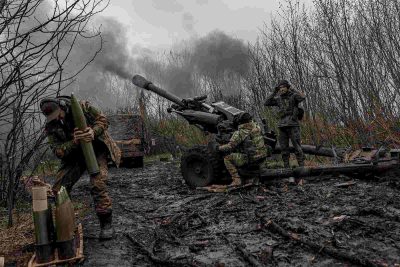Ukraine Attempts to Blame Russia for Humiliating Pentagon Leak

All Global Research articles can be read in 51 languages by activating the Translate Website button below the author’s name.
To receive Global Research’s Daily Newsletter (selected articles), click here.
Click the share button above to email/forward this article to your friends and colleagues. Follow us on Instagram and Twitter and subscribe to our Telegram Channel. Feel free to repost and share widely Global Research articles.
***
The Pentagon announced it was trying to remove from the internet a major leak of secret documents which have exposed plans relating to Ukraine’s war on Russia. For his part, Elon Musk sarcastically highlighted the vain attempt, saying on Twitter: “Yeah, you can totally delete things from the Internet – that works perfectly and doesn’t draw attention to whatever you were trying to hide at all.”
The American billionaire derided on Twitter the Pentagon’s attempt to remove social media posts containing leaked classified documents relating to the conflict in Ukraine. The day before his tweet, the New York Times newspaper indicated that officials were not successful in removing the publications from the internet.
The leak was described to the News York Times by a senior intelligence official as “a nightmare for the Five Eyes,” the intelligence sharing apparatus between the Anglo countries – the United States, Britain, Australia, Canada, and New Zealand. Some of the documents were found on Twitter and other sites on April 7, a day after US officials announced that they were investigating a potential leak of classified Ukrainian war plans. These war plans include an alarming assessment of Ukraine’s faltering air defence capabilities and notes that 12 brigades are being formed for Ukraine, including nine trained by the US and other NATO allies.
One of the leaks, dated February 23, is labelled “Secret/NoForn,” meaning it was not meant to be shared with foreign countries, and thus confirms the secrecy of the documents.
It is the belief of Mick Mulroy, a former senior Pentagon official, that the leak is “a significant breach in security” that could hamper Ukrainian military planning as it reportedly prepares for a spring offensive. “As many of these were pictures of documents, it appears that it was a deliberate leak done by someone that wished to damage the Ukraine, US, and NATO efforts,” he said.
The Kremlin said it had no doubts about the participation of the US or NATO, direct or indirect, in the conflict in Ukraine. None-the-less, the leaks would still provide a fascinating insight for decisionmakers in Moscow.
The New York Times reported that the leaks appear to be legitimate Defense Department documents. None-the-less, this did not stop Ukrainian officials from suggesting that the leak was only part of a Russian disinformation campaign aimed at influencing Ukraine’s possible spring offensive.
Ukrainian presidential advisor Mykhailo Podolyak told Reuters that the data contained a “very large amount of fictitious information” and Russia was trying to seize back the initiative in its “invasion.” His claims, instead, is part of Ukraine’s disinformation campaign, one that has been insisted upon yet exposed consistently since the first days of the war when we consider incidents like Snake Island.
Podolyak, for his part, had only recently spread his own “fictitious information” by claiming that Ukraine will capture Crimea through military means in the next five to seven months because Russia does not have enough resources to control the situation.
Despite ridiculous attempts by Kiev to contradict Washington and blame Moscow, US authorities are trying to find the culprit of the leak. According to a US official, they are determining how the documents were leaked by first identifying which officials had access to them.
The documents are at least five weeks old, with the most recent dated on March 1. The plans did not provide specific action such as when Ukraine would launch the offensive, but experts strongly believe it will occur during the spring. This offensive will include Western-trained troops and newly supplied weapons, including dozens of battle tanks. Although initial gains might be made, it is expected that the offensive will quickly tire out before Russia ultimately launches its own counteroffensive.
In preparing for this offensive, Ukraine has received 49 battle tanks from Western countries; London said it finished training a second group of Ukrainian soldiers on the AS90 self-propelled howitzers it is donating; Washington announced it was providing another $500 million in ammunition for howitzers, rocket artillery, Patriot anti-air systems and other systems; and Poland said it had transferred four of the 14 MiG-29 fighter jets it is giving Ukraine, following a similar move from Slovakia last month.
Very evidently, there is nowhere near enough resources to take an entire peninsula that has been militarised for the better part of eight years, let alone the regions between Crimea and where the Ukrainian forces currently are. No serious analyst believes that Ukraine will capture Crimea, let alone in a time frame of five to seven months, but the propaganda is aimed at securing more Western funds and weapons.
It is for this reason that the leaks are an embarrassing humiliation as it will likely hamper these efforts, and also why Podolyak tried denying them as Russian disinformation. But as Elon Musk sarcastically said: “Yeah, you can totally delete things from the Internet – that works perfectly and doesn’t draw attention to whatever you were trying to hide at all.”
*
Note to readers: Please click the share button above. Follow us on Instagram and Twitter and subscribe to our Telegram Channel. Feel free to repost and share widely Global Research articles.
Ahmed Adel is a Cairo-based geopolitics and political economy researcher.
Featured image is from InfoBrics

